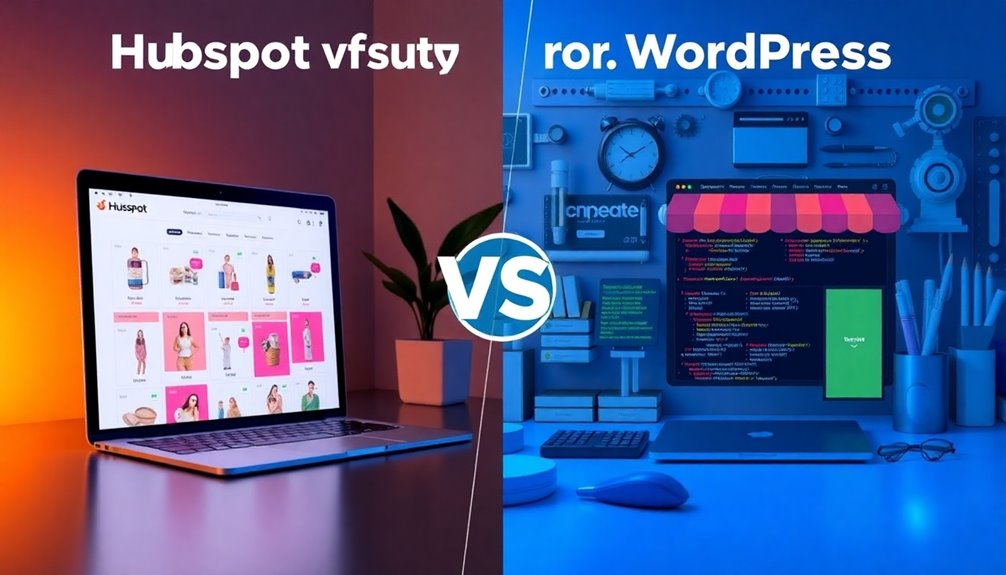When choosing between HubSpot and WordPress for your business, consider your needs. HubSpot offers an intuitive all-in-one solution with built-in security and seamless CRM integration, making it perfect for non-technical users. On the other hand, WordPress shines in customization and eCommerce capabilities, providing endless options through its extensive themes and plugins. However, it requires more technical skills and ongoing maintenance. If you want to explore which CMS truly fits your business, there's more to uncover.
Overview of HubSpot and WordPress
When you're choosing a content management system (CMS), understanding the basics of HubSpot and WordPress is essential.
HubSpot is an all-in-one, cloud-hosted CMS integrated with its CRM platform, making it ideal for businesses focused on inbound marketing and seamless marketing, sales, and service tools. It offers built-in security features, ensuring your website stays safe with regular updates. Additionally, HubSpot's hosting includes robust security measures, making it a secure choice for companies prioritizing data protection. Furthermore, its integrated features streamline the management of website security, reducing the need for additional plugins.
On the other hand, WordPress powers over 42% of websites globally and provides a free version (WordPress.com) and a self-hosted version (WordPress.org) for complete control. With over 59,000 plugins and 9,000 themes, WordPress excels in customization and flexibility, while HubSpot's marketplace offers limited options. Additionally, WordPress hosting can significantly affect website speed and performance, which is crucial for user experience and SEO efforts.
Each CMS has its strengths, catering to different needs in the content management systems landscape.
Ease of Use Comparison
When it comes to ease of use, you'll find that HubSpot offers a more straightforward user interface and a hassle-free content creation process, perfect for those without technical skills. Regular backups can serve as a safety net for your website, ensuring that you can recover quickly from any issues that may arise. Additionally, WordPress's extensive options can be overwhelming, requiring a bit more technical know-how to navigate effectively. Common installation problems may also arise for beginners who are unfamiliar with the setup process. Furthermore, many web hosts provide one-click installers for WordPress, which can simplify the setup process for beginners.
Let's explore how each platform stacks up with respect to user interface navigation, content creation, and the technical skills needed.
User Interface Navigation
Steering a content management system (CMS) can greatly influence your overall experience, especially for those new to web design.
HubSpot shines with its user-friendly interface, featuring a drag-and-drop editor that provides real-time previews, making content management intuitive. You'll find clearly defined tabs for website pages, landing pages, and blogs, streamlining your navigation.
On the other hand, WordPress offers multiple page-building options, but its default editor can be less intuitive. You might feel overwhelmed by the various menus and the extensive plugins available, which can create a steeper learning curve.
While WordPress has great flexibility, HubSpot's integrated marketing, sales, and service tools allow you to manage multiple functions seamlessly, enhancing your overall experience.
Content Creation Process
Steering the content creation process is just as important as understanding the user interface. With HubSpot CMS, you'll find an intuitive drag-and-drop editor that makes content management a breeze, even if you're not tech-savvy.
In contrast, WordPress can feel overwhelming, often requiring plugins like Elementor to achieve a similar ease of use.
Consider these emotional factors:
- Frustration from complex interfaces
- Joy in seamless content publishing
- Relief knowing your SEO is optimized
HubSpot offers built-in tools for SEO and analytics, while WordPress plugins like Yoast SEO add extra steps.
HubSpot's integrated features streamline lead generation, whereas WordPress relies on third-party plugins, making the content creation process more complicated.
Technical Skill Requirements
Although steering through the world of content management systems can be intimidating, understanding the technical skill requirements can make your choice clearer.
HubSpot excels in ease of use, featuring a drag-and-drop editor that requires minimal technical skills, making it perfect for non-technical marketers.
On the other hand, WordPress presents a steeper learning curve, especially for beginners, as you'll navigate numerous plugins and themes that can be overwhelming without prior experience.
While HubSpot's built-in tools reduce the need for technical knowledge, WordPress gives you extensive customization options, requiring some coding skills.
If you prefer simplicity, HubSpot's user-friendly approach might suit you better, but if you're willing to invest time and effort, WordPress offers greater flexibility and control.
Customization Capabilities

When it comes to customization capabilities, many users find that WordPress outshines HubSpot.
While HubSpot CMS offers a user-friendly drag-and-drop editor, it can't compete with the extensive modifications available through WordPress's thousands of themes and plugins.
You can create custom features and functionality effortlessly on WordPress, unlike HubSpot, which uses a proprietary coding language that requires specialized knowledge. Regular backups are essential to safeguard your customizations and ensure your site remains functional during changes or updates.
Consider these emotional draws of WordPress:
- Limitless design possibilities with various visual page builders.
- Seamless integration with third-party tools, enhancing functionality.
- Endless customization through a vast ecosystem of WordPress plugins, including customizable themes that cater to specific needs.
Additionally, WordPress allows for SEO optimization plugins that significantly enhance your site's visibility and performance.
Security Features and Considerations
When it comes to security features, HubSpot offers built-in measures like SSL certificates and end-to-end encryption, making it a solid choice for safety. Implementing strong passwords is crucial for protecting your WordPress site from unauthorized access. Additionally, activating two-factor authentication further enhances your site's defenses against potential breaches. To bolster your security, consider limiting login attempts to deter automated attacks and unauthorized access attempts. Understanding how each platform manages vulnerabilities can help you make an informed decision about your site's security.
Built-in Security Measures
As you consider a content management system (CMS) for your website, built-in security measures play an essential role in protecting your data and users.
HubSpot offers robust built-in security features like SSL certificates, network protection, and end-to-end encryption through its managed infrastructure. This minimizes vulnerabilities and guarantees peace of mind.
In contrast, WordPress security relies heavily on your hosting provider and plugins. You might face challenges such as:
- Frequent manual updates required
- Increased risk of security breaches
- Vulnerabilities due to third-party plugins
With HubSpot, you benefit from extensive security, including reCAPTCHA and spam filtering, reducing the need to worry about constant updates and maintenance.
This makes HubSpot a more secure choice overall.
Vulnerability Management Practices
While both HubSpot and WordPress offer unique approaches to vulnerability management, their effectiveness largely hinges on how security practices are implemented.
HubSpot security features provide a robust, built-in solution with automatic updates and SSL certificates, minimizing risks. This SaaS model inherently limits potential vulnerabilities by reducing the number of plugins and integrations.
On the other hand, WordPress security relies heavily on you to manage updates and monitor installed plugins, which can be time-consuming. Utilizing tools like Wordfence or Sucuri can bolster your site's defenses, but you must stay proactive.
Regularly updating themes and plugins is essential, as outdated software can expose your site to threats like DDoS attacks, making strong vulnerability management practices vital for WordPress users.
Hosting Provider Impact
Choosing the right hosting provider can make or break your WordPress site's security. Your site's safety hinges on the security features your host offers. High-end providers deliver essential protections, while subpar options can leave you vulnerable.
Consider these critical security aspects:
- SSL certificates to encrypt data and protect user information.
- Bot protection to fend off malicious automated attacks.
- Malware detection to catch threats before they cause harm.
Unlike HubSpot, which provides built-in security as a SaaS solution, WordPress sites require your vigilance.
You'll need to manage updates and monitor for potential vulnerabilities. Ultimately, your choice of hosting provider greatly impacts your site's security, so select one that prioritizes robust security measures.
Ecommerce Functionality

When it comes to eCommerce functionality, WordPress stands out as a top contender, especially with its powerful WooCommerce plugin. This plugin allows you to quickly set up an online store, offering extensive features and customization options that HubSpot can't match.
While HubSpot lacks a native eCommerce solution, it requires external platforms like Shopify or Volusion for online sales, which limits your flexibility. With WordPress, you can tailor your store to fit your business needs, making it a better choice if eCommerce is a priority. Moreover, the ability to enhance functionality through specialized plugins ensures that your online store remains competitive and secure. Additionally, using secure backup plugins like UpdraftPlus can help protect your eCommerce data effectively. Moreover, with options like VaultPress Backup, you can ensure that your data is secure and easily recoverable in case of any issues.
However, keep in mind that additional costs may arise from necessary plugins and features. Ultimately, if you're focused on building a robust online store, WordPress delivers superior eCommerce functionality compared to HubSpot.
Cost Analysis and Value Proposition
Cost analysis plays an essential role in deciding between HubSpot and WordPress, especially for businesses with tight budgets. HubSpot offers a straightforward pricing structure, starting at $23/month for basic features, which covers hosting, security, and maintenance.
In contrast, while the WordPress CMS is free, costs for hosting, themes, and plugins can add up quickly.
Consider these factors:
- Hidden costs can surprise you with WordPress.
- Time and resources spent on maintenance can drain your budget.
- All-in-one solutions like HubSpot simplify your planning.
If you need extensive marketing tools, HubSpot's value may outweigh the initial costs.
For basic sites, WordPress might be more budget-friendly but requires careful planning to avoid unexpected expenses.
Conclusion
In choosing between HubSpot and WordPress, picture yourself maneuvering a bustling marketplace. HubSpot shines with its all-in-one tools, guiding you effortlessly like a friendly vendor, while WordPress offers a canvas where you can paint your unique vision, albeit with a bit more effort. Ultimately, it boils down to your business needs—whether you prefer the streamlined path of HubSpot or the creative freedom of WordPress. Whichever you choose, you're setting the stage for success.



